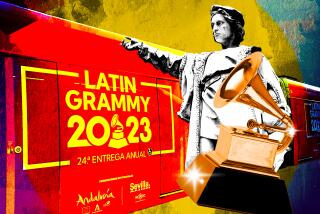Cuban Exiles Can Protest Near Latin Grammy Site
- Share via
MIAMI — Cuban American groups that oppose Cuban leader Fidel Castro accepted a city-brokered compromise Sunday that would let them hold protests across the street from the upcoming Latin Grammys.
Controversy erupted last week over just how close the Cuban exiles should be allowed to get to the Sept. 11 event. Citing the need to guarantee the safety of those attending the music awards show, the National Academy of Recording Arts & Sciences is considering whether to move the show to another location, perhaps outside of Miami.
It is unclear whether Grammy officials will agree to the compromise.
“We’re not prepared to make any comments on that,” Ron Roecker, director of communications for the academy, said Sunday evening.
On Friday, Miami Mayor Joe Carollo backed a proposal, now accepted by the exile organizations, to permit their assembly in front of Freedom Tower, across Biscayne Boulevard from the Grammys’ scheduled venue, AmericanAirlines Arena.
For Cuban Americans, the site has enormous historical resonance. After Castro seized power in 1959, Freedom Tower was the building where hundreds of thousands of Cuban refugees who fled to the United States were processed.
“This is the place that seems to be good for the police, the community, the exile community,” Luigi Crespo, a spokesman for the Miami mayor, told Associated Press.
Before these latest developments, however, officials of the local host committee said Grammys organizers opposed allowing the protesters as close as Freedom Tower.
Originally, Latin Grammys officials wanted to confine demonstrators to a site several blocks away from the arena. Cuban American organizations and the American Civil Liberties Union denounced that plan as a violation of constitutional guarantees of free speech.
The exile groups object to the Grammys honoring musicians from Cuba or allowing them to perform. To do so, they say, is to allow the show, intended to showcase the premier Latin artists, to be hijacked by Cuba’s Communist government.
Organizers of the Latin Grammys, which were held for the first time last year in Los Angeles, counter that their chief responsibility is to ensure the safety of musicians and other attendees. They point out the history of violent demonstrations by anti-Castro groups.
Roecker said Sunday that organizers had not set a deadline for deciding whether to go ahead with the show as planned in Miami.
More to Read
The biggest entertainment stories
Get our big stories about Hollywood, film, television, music, arts, culture and more right in your inbox as soon as they publish.
You may occasionally receive promotional content from the Los Angeles Times.










